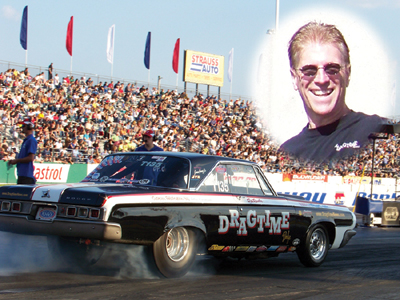| (Article
begins on the Bracket Racing 101 page HERE)
 Shortly
before writing this column I was on location at the NHRA
Division 1 Lucas Oil Drag Racing Series at Old Bridge Township
Raceway Park in Englishtown, NJ. One of the announcers was
Lewis Bloom, with whom you may be familiar from the NHRA
broadcasts on TV. I told Lewis how much I enjoyed his insightful
analysis and statistics, and it got me to thinking about
how I’ve used similar historical analysis in my own
racing. This is a great time to have this discussion, now
that the past season is behind us and we’ve started
planning for the new one. Shortly
before writing this column I was on location at the NHRA
Division 1 Lucas Oil Drag Racing Series at Old Bridge Township
Raceway Park in Englishtown, NJ. One of the announcers was
Lewis Bloom, with whom you may be familiar from the NHRA
broadcasts on TV. I told Lewis how much I enjoyed his insightful
analysis and statistics, and it got me to thinking about
how I’ve used similar historical analysis in my own
racing. This is a great time to have this discussion, now
that the past season is behind us and we’ve started
planning for the new one.
Although
past history is not a guarantee of future events, having
knowledge about the past can help us play the odds better
on the track. You don’t think odds and averages are
at work? Think of it this way: going .000 and dead-on might
look impressive on the board, but it’s not required
to win. What’s required is to be better than the racer
in the other lane. You won’t be better every time;
there are times when you’ll just get beat, but the
goal is to be better on average than your opponents. Bracket
racers aren’t called gambler racers for nothing, and
if you play to your strengths and perhaps uncover some weaknesses
that you can address and improve upon, you’ll improve
your odds and will be in a better position to win more rounds.
Here’s
what you’ll need to do this little exercise: a notepad,
a pen, a calculator, and a season’s worth of time
slips. Those time slips are a goldmine of data and can absolutely
help you understand your strengths and weaknesses. All it
takes is a little time to crunch some numbers.
There
are so many statistics and comparisons you can pull from
your time slips, but for the purpose of this column and
in the interest of space, let’s focus on the start
of the race, the reaction time. Go through your elimination
time slips and write down your reaction times (notice I
said “elimination time slips;” time trials don’t
count. We only care about elimination rounds). Write your
green-lights in one column and your red-lights in a separate
column. Also write down your opponents’ green-lights
and red-lights, keeping those in separate columns as well.
Make note of how many elimination rounds you’ve logged.
Now
take your calculator and start adding all your green-light
reaction times. All you’re trying to do is come up
with your average green-light reaction time over the course
of the season. In my case, I’ve logged 51 green-light
elimination rounds so far as of this writing, and the sum
of those green-lights was 1.674. 1.674 divided by 51 = .033.
Therefore my average green-light is .033. During the course
of the season I’ve had 4 red-light elimination rounds,
and the sum of those red-lights was -.019. Therefore my
average red-light was .005. Now do the same for your opponents.
In my case, my opponents’ average green-light reaction
time during eliminations was .060. This tells me that although
I’m doing reasonably well at the start of the race
and often have the reaction-time advantage, I’m risking
vulnerability against racers who might get in on my .033
average.
This
is just the beginning of what your time slips can tell you.
It can be enough to drive you batty. You can determine your
average light when you’re leaving first vs. leaving
second, your average daytime reaction, average night-time
reaction, how many times you took too much stripe and broke
out, how much stripe you take on average, how many times
the car threw you a curveball and wouldn’t run the
number, etc. Don’t get too mired in the stats and
numbers; you’re just trying to get a better understanding
of how your races have gone down on average so that you
can make some tweaks and changes to try to improve your
odds.
|



